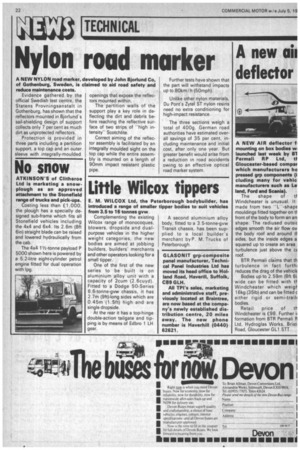Nylon road marker
Page 24

If you've noticed an error in this article please click here to report it so we can fix it.
A NEW NYLON road marker, developed by John Bjorlund Co, of Gothenburg, Sweden, is claimed to aid road safety and reduce maintenance costs.
Evidence gathered by the official Swedish test centre, the Statens Provningsanstalt in Gothenburg, has shown that the reflectors mounted in Bjorlund's sail-shielding design of support collects only 7 per cent as much dirt as unprotected reflectors.
Protection is provided in three parts including a partition support, a top cap and an outer sleeve with integrally-moulded openings that expose the reflectors mounted within.
The partition walls of the support play a key role in deflecting the dirt and debris before reaching the reflective surface of two strips of "high intensity" Scotchlite.
Correct aiming of the reflector assembly is facilitated by an integrally moulded sight on the top cap while the entire assembly is mounted on a length of 90mm impact resistant plastic Pipe,
Further tests have shown that the part will withstand impacts up to 80km /h (50mph).
Unlike other nylon materials, Du Pont's Zytel ST nylon resins need no extra conditioning for high-impact resistance.
The three sections weigh a total of 400g. German road authorities have estimated overall savings of 35 per cent, including maintenance and initial cost, after only one year. But greater benefit would arise from a reduction in road accidents owing to an effective optical road marker system.












































































































































































































